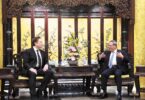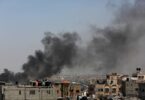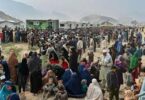While announcing no change in the monetary policy based on high interest rate, Governor State Bank Reza Baqir predicted that GDP growth rate may be lower than the expected target of 3.5 percent due to decline in the productivity of agriculture sector and contraction in large scale manufacturing. He said that inflation rate will remain high within the range of 11-12 percent during the current fiscal year. However, it will start falling from the next fiscal year and stabalise within 5-7 percent during six to eight months.
Governor State Bank rejected the perception that the recent increase in the Banks’s foreign exchange reserves was achieved by foreign investment in treasury bills and the hot money may create problem when interest rates are down. He said the State Bank foreign currency reserves went up as result of improvement in the current account deficit. He claimed that central bank has been effectively performing its regulatory function in curbing money laundering and terror financing.
The objective assessment of governor central bank implies that down turn of economy will continue even in the next fiscal year and it will be difficult to address the causes responsible for it. The factors that will keep the economy sluggish are the high interest rate, increase in the import cost of industrial raw material and intermediate goods, technological stagnation, electricity and gas tariff hikes and regressive taxation regime.
Hikes in the electricity tariff by way of fuel price adjustments, taxes and surcharges month on month basis abnormally pushes up cost of doing business. All Pakistan Textile Mills Association has warned that further increase in electricity price will lead to 30 percent suspension in production capacity. If the practice of jacking up electricity tariff continues, then in Punjab alone 100 textile mills will shut down, rendering 500,000 people directly and indirectly jobless. If government cannot facilitate creation of more jobs as promised by the Prime Minister then there seems no justification to make poor people lose jobs because of adhoc fiscal measures that make worse the existing unfavourable economic environment. It merits mention that in January 2019, the government had set the tariff of 7.6 cents per unit, inclusive of taxes and surcharges, for the export industries such as textile. The facility has now been withdrawn from retrospective effect which will push up the industrial tariff to 13 cents per unit, rendering the textile products uncompetitive in the global market. The exports of textiles are stagnant at $3.7 billion over the past several years. In the proposed textile policy for the next 10 years, regionally competitive energy tariff has been included as major incentive in the foreseeable future. But in practice this incentive may not come if the present practice of increase in the tariffs of electricity and gas is any guide. Petroleum Division has moved a summary for 5-15 percent increase tariff for different categories of consumers. It is likely that ECC will approve it, hitting hard across the board all industries.
Policy of free float exchange rate determination has depreciated local currency by almost 50 percent. It has made the import of completely knockdown and semi-knockdown automobile kits very expensive. The assemblers of auto-sector have increased the prices of cars, trucks and tractors. The demand for all types of vehicles dropped by 72 percent, leading to suspension in production activities and scaring away the automobile manufacturing companies of Renault and Hundai from setting up their manufacturing plants in Pakistan in addition to the delay in implementation of parts and components localization project by Nissan Motors in collaboration with Ghandara-Nissan Company.
Governor State Bank has also expressed the hope that Pakistan will move out of the FATF greylist as the Bank is effectively performing its regulatory function to curb money laundering and terror financing. How this function has been made robust when no legislation has been done so far to amend Protection of Economic Reforms Act of 1992 which dilutes the powers of central bank to regulate the transfer of money abroad from foreign currency accounts. The points of FATF action plan for strengthening the legal and institutional framework for making anti-money laundering and counter terrorism regimes strong are yet to be implemented.






